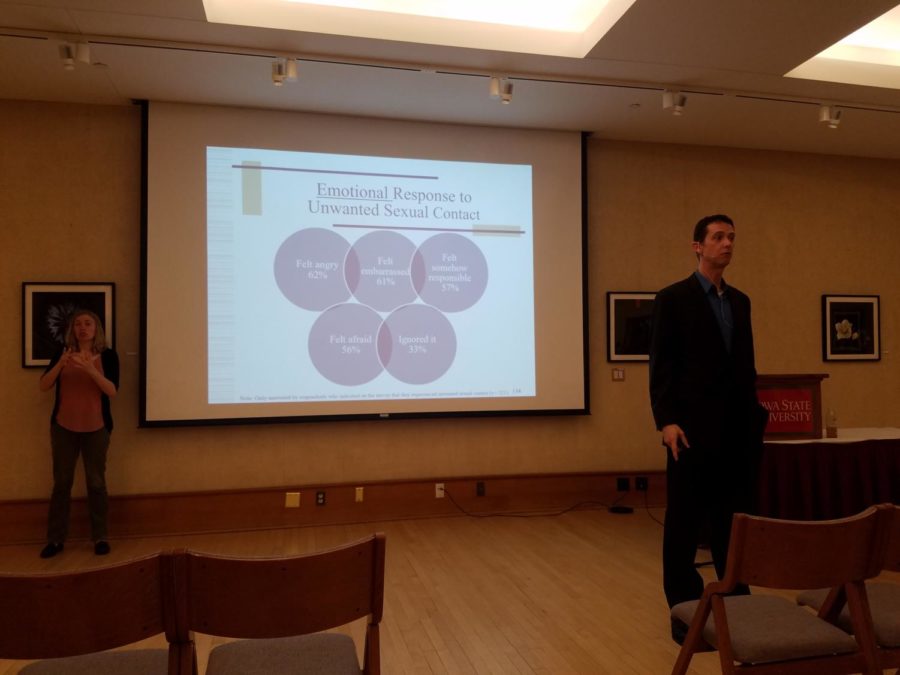- App Content
- App Content / News
- News
- News / Diversity
- News / Politics And Administration
- News / Politics And Administration / Campus
Campus Climate Survey Part One: Unwanted sexual experiences at Iowa State
May 12, 2018
The full results of the fall 2017 campus climate survey, which was completed by 7,326 members of the Iowa State community and conducted by Rankin & Associates Consulting, were released on Wednesday evening.
Here is the Daily’s breakdown of the data, including quotes from the comment section of the survey where available.
Unwanted Sexual Experiences
Eleven percent of respondents indicated on the survey that they had experienced unwanted sexual contact/conduct, with one percent experiencing relationship violence (e.g. ridiculed, controlling behaviors, physical violence), two percent experiencing stalking (e.g. being followed, repeated phone calls or text messages), eight percent experiencing unwanted sexual interaction (e.g. catcalling, repeated sexual advances, sexual harassment) and three percent experiencing unwanted sexual contact (e.g. fondling, rape, sexual assault) while a member of the Iowa State community.
For every subcategory except stalking, transpectrum respondents saw the highest rates, women the second highest and men the lowest.
Relationship Violence
Fifteen percent of respondents who experienced relationship violence officially reported it, 85 percent did not.
Respondents who did not report the issue often cited feeling as if they had handled it, a fear of consequences for reporting, not feeling like reporting was worth it and not realizing it was abuse as reasons for not reporting.
While some respondents ended the relationship, others said they felt unable to do so. One shared, “I didn’t want my boyfriend to get arrested.” Another respondent said, “I was also worried that because he was my supervisor that I would risk losing my job.”
Many responses indicated they did not believe what happened was abuse at the time. In some cases, this was because the abuse was not physical.
“To me, I felt that control and emotional abuse didn’t classify as something that needed to be reported,” one respondent said.
Stalking
Eighty percent of respondents did not officially report the stalking, while 20 percent did report the incidents.
Among respondents who explained why they did not report their stalking, one theme emerged: not being taken seriously.
One respondent wrote, “I only selected that it was not handled well because when I told the University Police officer who was doing the stalking it seemed like he dismissed it because that person wasn’t a threat and was the subject of many complaints. I’m sure he didn’t mean it that way, but I felt dismissed.”
Unwanted Sexual Interactions
Unwanted sexual interactions include catcalling, repeated sexual advances and sexual harassment.
Seven percent of respondents officially reported the incidents. Of those, 30 percent were satisfied with the outcome, 37 percent felt their report was responded to appropriately and 33 percent felt it was not responded to appropriately.
The five themes gathered from respondents who did not file reports were because the incident was catcalling, not seeing it as a big deal, expecting no response, fear of the consequences and feeling as though they handled the situation.
Unwanted Sexual Contact
Unwanted sexual conduct includes fondling, rape and sexual assault.
Of the respondents who identified as being the victim of unwanted sexual contact, 90 percent did not report the incident. Of the 10 percent who did report, half were satisfied with the outcome.
There were four respondents who explained why they did not feel their report of unwanted sexual contact was responded to appropriately. No theme emerged from the responses so Rankin & Associates Consulting decided not to publish them.
There were six themes gathered from respondents’ reasons for not reporting and the following comments have been taken directly from their survey responses.
Fear of Consequences
“I was afraid that the perpetrator would come after me if I reported it, because we were only acquaintances.”
“I didn’t want to make things awkward within our friend group, and I didn’t want to be the center of attention/start drama.”
Blaming Themselves
“I feel partly responsible, because I only said no a couple of times, which I know is not the way to think about it. However, it stopped me from reporting it.”
“Because there was alcohol involved, and although I said I did not want to have sex, I still allowed it to happen.”
Thinking It Wasn’t Serious
“It wasn’t, at the time, a serious concern. My former roommate had some friends over (and) were acting stupid when it happened. It was fondling and not rape or assault, so it didn’t seem necessary.”
“Not a big deal. People make mistakes when drunk.”
Expecting No Response
“Sexual assault in fraternities are usually not taken seriously.”
“Rape and sexual assault cases, more often times than not, go unresolved. No point in putting myself in a position of confronting my abusers with little to no consequences.”
“Who will believe me?”
Reporting Taking Too Much Effort
“I didn’t want to deal with it. The process, so I have heard, is long and incredibly demanding of the victim to prove the act occurred.”
“I just wanted to move on right away and not have to think about it or deal with it any more than I had to.”
Having Limited Details To Share
“They disappeared from the situation before I could figure out who they were or where they were going.”
“It was a stranger, I couldn’t charge them.”
















